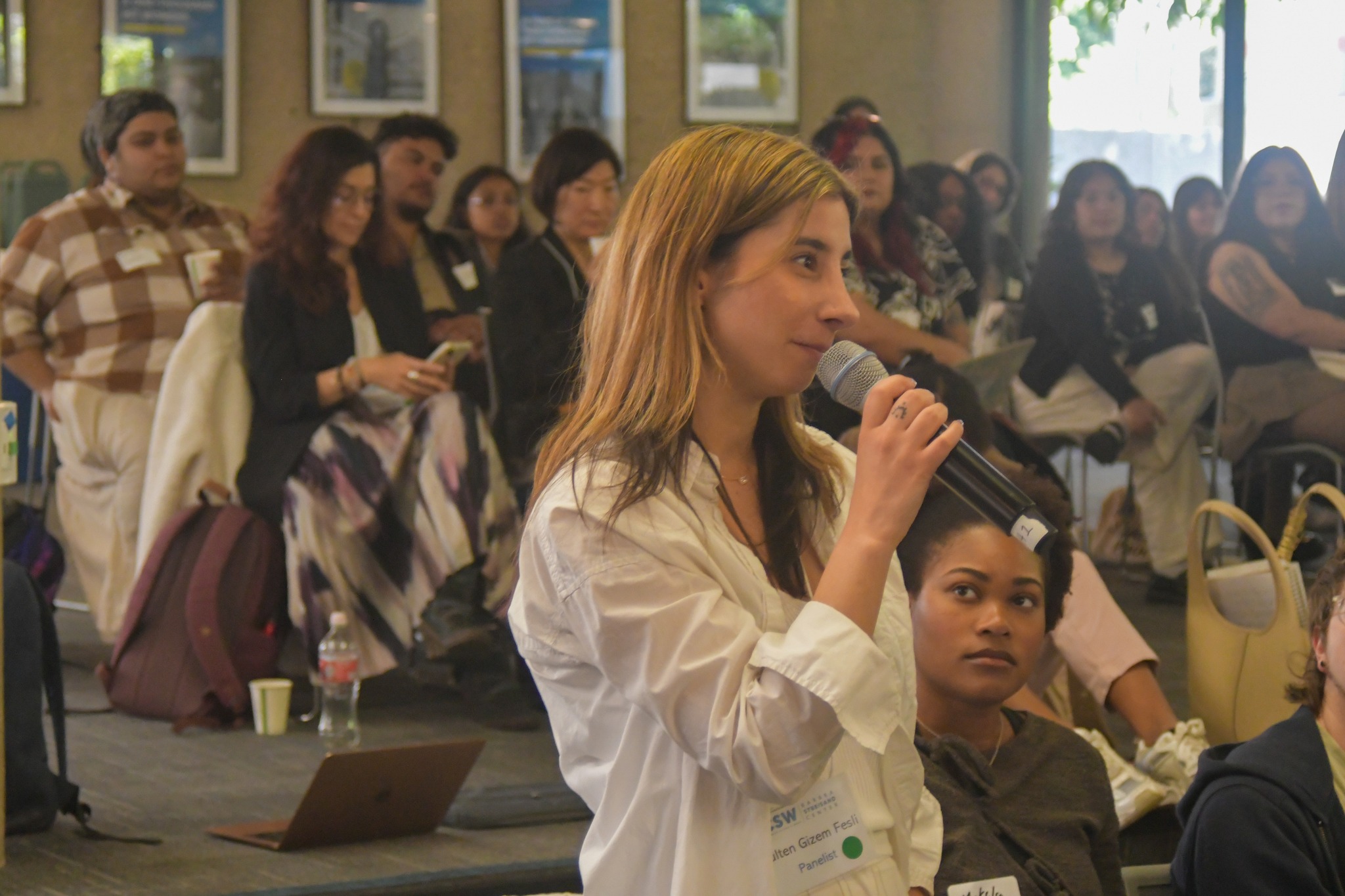Bridging Borders: Gendered Labor and Solidarity at UCLA’s Conference, Center for the Study of Women | Barbra Streisand Center

By Gülten Gizem Fesli (she/her), MA, Thinking Gender Workshop Attendee; Labor Studies PhD Candidate at the University of Erlangen-Nuremberg
The Thinking Gender 2025: Gendered Labors and Transnational Solidarities conference—presented in partnership with the UCLA Transnational Gender and Labor Working Group—was an empowering event that placed domestic workers and their labor organizing efforts at its center. The three-day conference opened with a keynote by Adriana Paz Ramírez, president of the International Domestic Workers Federation, and a workshop on contemporary research into gender and the histories of labor organizing.
The first workshop had an international focus, with participants joining from across Europe. One participant shared a paper on domestic workers organizing in New York City with Andolan, a South Asian domestic workers’ movement from the 1990s. I presented my own work-in-progress on domestic care workers’ organizing efforts in Germany and the United States.
Striking similarities emerged in both presentations, particularly in how domestic care workers organize across vastly different national contexts. One of the key themes of this session was the difficulty of organizing care workers due to the informality inherent in both the care economy and care work. Unlike traditional labor organizing frameworks—where workers are assumed to belong to a company, workplace, or union-eligible entity—caregivers typically labor in private households. The household, framed in dominant narratives as a site of intimacy and emotional labor, challenges conventional understandings of formal labor.
In these contexts, caregivers are expected to prioritize the needs of others—namely, those they care for—above their own working conditions. This expectation stands in direct contrast to the foundational premise of formal labor organizing, which demands advocacy for workers’ rights. Because care labor is often feminized and racialized, the presumption that caregivers should be selfless and emotionally invested further discourages efforts toward collective bargaining or unionization. As such, the domestic care economy remains precarious and undervalued, despite the essential nature of the work.
The second workshop explored the methodologies needed to apprehend labor. One participant presented research on Black women’s labor and its representation in museums, emphasizing how Black women have redefined domestic and care work as revolutionary acts. Another participant shared their ethnographic work on Chinese and Chinese American massage workers, drawn from research conducted at three Chinese-owned establishments in California’s San Gabriel Valley.
The third workshop addressed themes of curative violence, reproduction, and social movements. One participant presented doctoral research on Black girls, labor, and hospital interactions. Another participant discussed maternal anxieties regarding childbirth and surrogacy in China. A third participant shared findings from case studies of female migrant workers in Japan. The workshop closed with presentations on the labor misunderstandings between farm-working families and first-generation graduate students, on Silingan coffee mothers and anti-drug violence advocacy, and on sisterly care within a brown lesbian community as exemplified by Las Hermanas.
Day two of the conference featured a workshop led by UCLA Labor Center Director Saba Waheed on “research justice” as a critical framework. Developed during her time with the New York-based Domestic Workers United (DWU), the research-justice model centers community-led data collection and analysis. Domestic workers conducted their own research, asserting themselves as experts and agents of change. This approach not only privileges lived experience, but also connects research to organizing, policy advocacy, and movement building. Centering domestic workers within the research process affirms their authority, ensures their narratives are heard, and provides a foundation for meaningful systemic change.
The third and final day of the conference featured a keynote address by Adriana Paz Ramírez, president of the International Domestic Workers Federation. In her remarks, Paz Ramírez emphasized the need for formal recognition of domestic work by systematizing knowledge in the field and acknowledging the specialized skills it requires. As a labor studies researcher, I was particularly struck by her call to integrate domestic workers into national social security systems and her advocacy for a politically strategic, worker-led movement. She stressed that this is a pivotal moment for advancing the rights of domestic workers and urged labor centers and unions to incorporate these demands into their platforms.
My main takeaways from the Thinking Gender 2025 conference are that domestic work, which often takes place in private households, poses significant challenges to traditional labor organizing models. In addition, the feminized and racialized nature of care work reinforces expectations of selflessness, discouraging advocacy and collective action. There is an urgent need for the formal recognition of domestic work, including the integration of domestic workers into national social security systems and the support of a politically strategic, worker-led movement. Ultimately, this is a pivotal moment for advancing domestic workers’ rights, and it is essential that unions and labor centers actively work to include these demands in their agendas.
About the Author
Gülten Gizem Fesli (MA) is a PhD candidate advised by Prof. Dr. Ingrid Artus (Chair for Comparative Social Structure Analysis, Institute for Sociology, University of Erlangen-Nuremberg) and Prof. Dr. Annette Henninger (Dean and Professor for Gender and Politics, University of Marburg). She is a Doctoral Candidate at the Doctoral College for Intersectionality Studies at the University of Bayreuth and a Fellow of the Hans-Böckler-Foundation. She was an affiliated fellow at the Center for Comparative Immigration Studies at the University of California, San Diego (2024–2025) and currently lectures at the Institute for Sociology at the University of Erlangen-Nuremberg.

